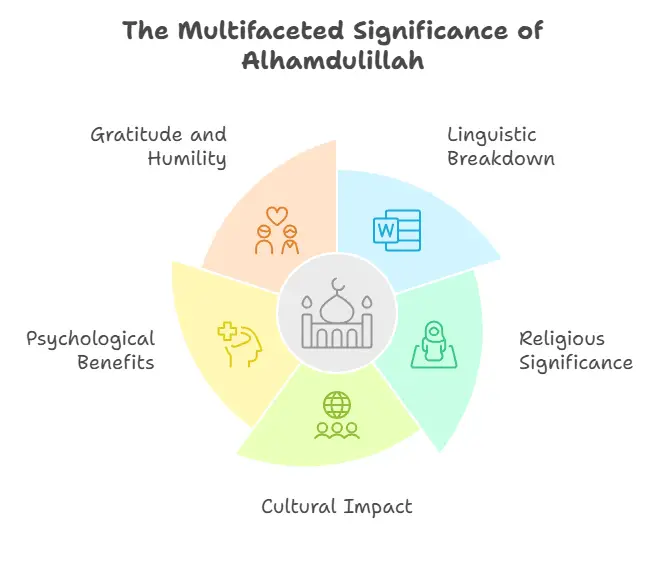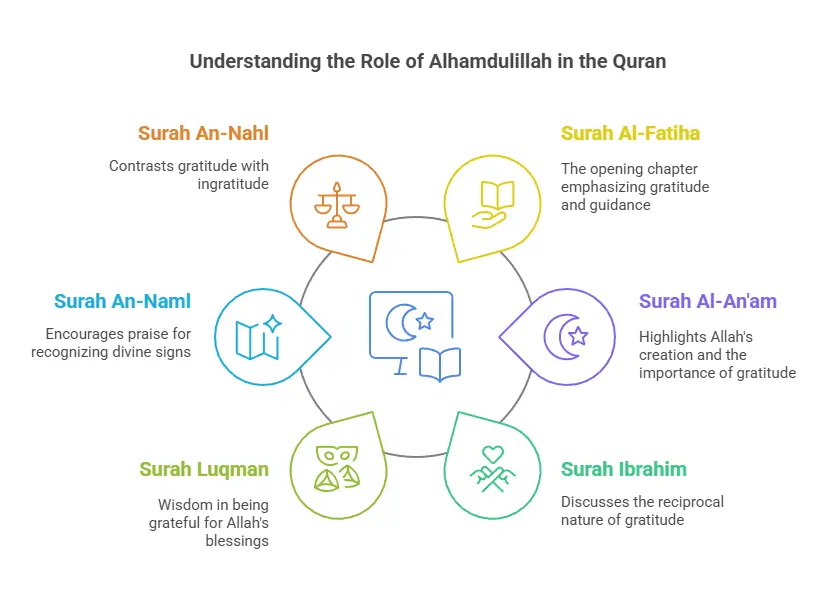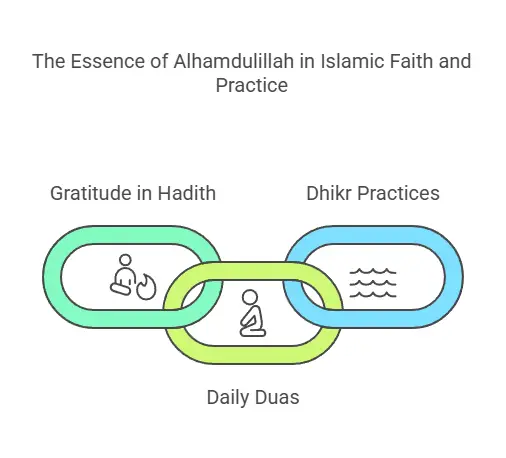
Alhamdulillah Meaning is a phrase that resonates deeply within the hearts of Muslims worldwide. It is more than just a word; it is an expression of gratitude, a reminder of Allah’s countless blessings, and a cornerstone of Islamic faith.
But what does Alhamdulillah truly mean, and why is it so significant in Islam? In this comprehensive guide, we will explore the meaning of Alhamdulillah, its linguistic roots, its presence in the Quran and Hadith, and its profound impact on the daily lives of Muslims.
Whether you are a Muslim seeking to deepen your understanding or someone curious about Islamic culture, this article will provide you with a thorough understanding of Alhamdulillah and its importance.
Join us as we delve into the essence of gratitude in Islam and discover how this simple phrase can transform your life.
Introduction to Alhamdulillah
What Does Alhamdulillah Mean?
The Arabic expression Alhamdulillah represents profound importance in the Islamic faith.
The phrase means “Praise be to Allah” and can also be understood as “All praise is due to Allah.” The phrase is composed of three parts: The expression ‘Alhamdulillah’ consists of three parts: ‘Al’ which means ‘the,’ ‘hamd’ which means ‘praise,’ and ‘lillah’ which means ‘to Allah.’
The combination of these words delivers a full expression of thankfulness and recognition of Allah’s gifts.
According to Islamic teachings Alhamdulillah functions as both a faith declaration and a reminder about Allah’s supreme power.
Muslims use this expression for both ordinary daily discussions and formal religious prayers because it emphasizes the necessity of gratitude throughout their lives.
The Quran and Hadith establish “Alhamdulillah” as a central practice in Islamic worship and everyday life.
The Importance of Alhamdulillah in Islam
Alhamdulillah represents the highest form of gratitude within Islam which holds gratitude as a core principle.
The Quran and Hadith stress the significance of gratitude toward Allah while Alhamdulillah functions as an ongoing reminder of this responsibility.
Through the recitation of Alhamdulillah Muslims both strengthen their belief and acknowledge the divine source of all positive aspects in their lives.
Both Quranic verses and Hadith passages demonstrate the significance of Alhamdulillah.
The Quran begins with Surah Al-Fatiha which uses the phrase “Alhamdulillahi Rabbil ‘Alamin” (Praise be to Allah, the Lord of all the worlds) to establish the theme for the whole book.
The verse highlights gratitude as a fundamental aspect of Islam while reminding believers that all praises belong to Allah.
The Prophet Muhammad (peace be upon him) taught Muslims to express gratitude regardless of their life situation including periods of difficulty and ease.
This practice boosts religious devotion and helps people develop a positive perspective towards life.
The frequent utterance of Alhamdulillah enables Muslims to develop humility alongside recognition for all of Allah’s numerous blessings.
Why Alhamdulillah Meaning Matters
Both Muslims and non-Muslims need to comprehend the meaning of Alhamdulillah in order to understand its significance.
Muslims experience a strengthened bond with Allah which enriches their spiritual life when they understand Alhamdulillah.
The phrase reminds people to maintain gratitude in every situation which helps to develop contentment and peace.
Non-Muslims who learn about Alhamdulillah gain valuable insights into Islamic cultural practices and foundational values that influence more than one billion people globally.
The phrase demonstrates how gratitude and humility function as universally respected foundational values.
Saying Alhamdulillah provides a significant tool to enhance mental and emotional health in a world dominated by stress and negativity.
The practice pushes people to recognize life’s positive elements which develops gratitude and strengthens their resilience.
alhamdulillah meaning represents more than a simple expression because it defines a way of living.
The expression Alhamdulillah represents Islamic principles of thankfulness and modesty while reminding people of divine blessings from Allah.
People develop a stronger bond with Allah while achieving a more optimistic perspective on life when they integrate Alhamdulillah into their everyday routines.
Alhamdulillah in the Quran
Quranic Verses Featuring Alhamdulillah
Islamic scripture frequently includes the phrase Alhamdulillah to demonstrate its essential role in the Quran.
The Surah Al-Fatiha serves as one of the key instances where this phrase appears because Muslims recite it during each unit of Salah as it opens the Quran. The verse begins with:
“Alhamdulillahi Rabbil ‘Alamin”
(“Praise be to Allah, the Lord of all the worlds.”)
(Quran 1:2)
This verse sets the tone for the entire Quran, emphasizing the centrality of gratitude and praise to Allah. Another significant mention is in Surah Al-An’am (6:1):
“Alhamdulillah allathee khalaqa alssamawati waalarda wajaAAala alththulumati waalnnoora thumma allatheena kafaroo birabbihim yaAAdiloona”
(“Praise be to Allah, who created the heavens and the earth and made the darkness and the light. Yet those who disbelieve equate others with their Lord.”)
These verses, among many others, highlight Alhamdulillah as a recurring theme in the Quran, reminding believers to acknowledge Allah’s creation, blessings, and mercy.
The Significance of Alhamdulillah in Surah Al-Fatiha
Islamic worship considers Surah Al-Fatiha as the “Essence of the Quran” because of its unique significance.
Muslims repeat Alhamdulillah as part of their daily Salah sessions. The verse “Alhamdulillahi Rabbil ‘Alamin” functions as an earnest proclamation of thankfulness and acknowledgment of Allah’s supreme authority.
The Quran begins with Alhamdulillah to emphasize its role as a fundamental guiding principle for Muslims.
The concept of gratitude extends beyond intermittent actions to become an enduring mindset and emotional condition.
Alhamdulillah as a Theme in the Quran
The Quran frequently discusses gratitude as a key theme with Alhamdulillah serving as its most direct expression.
The Quran offers multiple reminders about the necessity of thanking Allah because gratitude connects directly to faith and righteousness. For example:
- In Surah Ibrahim (14:7), Allah says:
“And [remember] when your Lord proclaimed, ‘If you are grateful, I will surely increase you [in favor]; but if you deny, indeed, My punishment is severe.'”
This verse highlights the reciprocal nature of gratitude: the more thankful a person is, the more blessings they receive from Allah.
- In Surah Luqman (31:12), Allah reminds believers:
“And We had certainly given Luqman wisdom [and said], ‘Be grateful to Allah.’ And whoever is grateful is grateful for [the benefit of] himself. And whoever denies [His favor] – then indeed, Allah is Free of need and Praiseworthy.”
Here, gratitude is portrayed as a means of self-benefit, reinforcing the idea that being thankful enriches one’s own life.
- In Surah An-Naml (27:93), Allah says:
“And say, ‘Praise to Allah, who will show you His signs, and you will recognize them. And your Lord is not unaware of what you do.'”
This verse encourages believers to praise Allah for His signs and blessings, which are evident in the world around them.
The Quran also contrasts gratitude with ingratitude, often referring to those who fail to recognize Allah’s blessings as “kafir” (disbelievers). For instance, in Surah An-Nahl (16:83):
“They recognize the favor of Allah; then they deny it. And most of them are disbelievers.”
This stark contrast serves as a reminder that gratitude is not just a moral virtue but a fundamental aspect of faith.
One unique aspect of alhamdulillah meaning in the Quran is its universality. While it is an Islamic phrase, its message of gratitude transcends religious boundaries.
The Quranic emphasis on gratitude resonates with people of all faiths, as it speaks to a fundamental human experience: the recognition of blessings and the desire to express thankfulness.
This universality makes alhamdulillah meaning not just a religious expression but a timeless reminder of the power of gratitude in shaping a meaningful and fulfilling life.
Alhamdulillah in Hadith
Prophetic Traditions Highlighting Alhamdulillah
The Hadith contains Prophet Muhammad’s sayings and actions (peace be upon him) which demonstrate the profound significance of Alhamdulillah for Muslims.
The Prophet underscored gratitude as essential to faith and directed Muslims to proclaim Alhamdulillah under every situation.
One well-known Hadith narrated by Abu Malik Al-Ash’ari states:
“Purity is half of faith, and ‘Alhamdulillah’ fills the scale.”
(Sahih Muslim)
This Hadith highlights the immense spiritual weight of saying alhamdulillah meaning. It signifies that expressing gratitude to Allah is not just a small act of worship but a significant one that can elevate a believer’s faith.
Another Hadith narrated by Abu Hurairah recounts:
“Whenever the Prophet (peace be upon him) saw something he liked, he would say, ‘Alhamdulillah alladhi bi ni’matihi tatimmu as-salihat’ (Praise be to Allah by whose favor good deeds are accomplished). And when he saw something he disliked, he would say, ‘Alhamdulillah ‘ala kulli hal’ (Praise be to Allah in all circumstances).”
(Ibn Majah)
This tradition teaches Muslims to say Alhamdulillah in both favorable and challenging situations, reinforcing the idea that gratitude should be a constant state of mind.
The Role of Alhamdulillah in Daily Duas
The phrase Alhamdulillah holds a central position in Islamic daily prayers which are known as Duas.
Prayers often start and end with this phrase which acts as a bookend of gratitude. The Prophet Muhammad (peace be upon him) instructed his followers to begin their day with words of gratitude.
“Alhamdulillahil-lathee ahyaana ba’da ma amaatana wa ilayhin-nushoor.”
(“Praise be to Allah who gave us life after death and to Him is the resurrection.”)
(Sahih Bukhari)
This Dua reminds Muslims to be thankful for the gift of life and to acknowledge Allah’s power over life and death.
Another example is the Dua after eating:
“Alhamdulillahil-lathee at’amana wa saqana wa ja’alana minal muslimeen.”
(“Praise be to Allah who fed us, gave us drink, and made us Muslims.”)
(Sunan Abu Dawood)
These Duas illustrate how Alhamdulillah is woven into the fabric of daily life, ensuring that gratitude remains a constant practice.
Alhamdulillah as a Form of Dhikr (Remembrance of Allah)
The Islamic practice of Dhikr involves remembering Allah and Alhamdulillah stands out as one of its most effective expressions.
The Prophet Muhammad (peace be upon him) taught Muslims to practice Dhikr regularly to deepen their relationship with Allah and cleanse their hearts.
One Hadith narrated by Abu Hurairah states:
“There are two words that are light on the tongue but heavy on the scale and beloved to the Most Merciful: ‘SubhanAllahi wa bihamdihi, SubhanAllahil-‘Adheem’ (Glory be to Allah and praise Him, Glory be to Allah the Almighty).”
(Sahih Bukhari)
While this Hadith mentions a specific form of Dhikr, it underscores the importance of praising Allah, which is the essence of Alhamdulillah.
Another Hadith highlights the simplicity and power of saying Alhamdulillah:
“Whoever says, ‘SubhanAllah’ (Glory be to Allah) thirty-three times, ‘Alhamdulillah’ thirty-three times, and ‘Allahu Akbar’ (Allah is the Greatest) thirty-three times after each prayer, and completes it with ‘La ilaha illa Allah wahdahu la sharika lahu, lahul mulku wa lahul hamdu wa huwa ‘ala kulli shayin qadeer’ (There is no god but Allah alone, with no partner, to Him belongs all sovereignty and praise, and He is over all things competent), will have his sins forgiven, even if they were as much as the foam of the sea.”
(Sahih Muslim)
This Hadith demonstrates how Alhamdulillah, when combined with other forms of Dhikr, can lead to immense spiritual rewards.
One unique aspect of alhamdulillah meaning in the Hadith is its adaptability. It can be used in a variety of contexts, from expressing joy and relief to seeking comfort in difficult times.
Conclusion
Within Islamic practice and belief Alhamdulillah stands as more than gratitude because it represents a fundamental element of faith.
The Quran and Hadith establish alhamdulillah meaning as an enduring expression of Allah’s infinite blessings and mercy.
Muslims who say Alhamdulillah both during periods of happiness and suffering find themselves able to sustain a balanced view of life which builds their humility and resilience while enhancing their sense of gratitude.
The phrase Alhamdulillah represents the core principles of Islamic gratitude through both its linguistic roots and spiritual meaning.
This phrase reaches beyond cultural and linguistic divides while touching people from every background.
Muslims who practice gratitude through Alhamdulillah deepen their relationship with Allah while establishing a positive mental outlook and handling life’s difficulties with strong faith and elegance.
Through understanding the significance of alhamdulillah meaning we should work to make gratitude the foundation of our daily existence.
Our spiritual path becomes more meaningful when we express gratitude to Allah through words, actions or intentions as this practice helps us get closer to Him.
When you encounter any kind of blessing remember to say Alhamdulillah to demonstrate your faith and thankfulness.
This guide aims to enhance your comprehension of Alhamdulillah and its role within the Islamic faith. M
ake this powerful phrase an essential part of your daily routine and discover how gratitude can transform your life.
Let us know what you think by leaving a comment below if this article was beneficial to you and share it with others.
How has saying alhamdulillah meaning impacted your life? We’d love to hear your stories!






